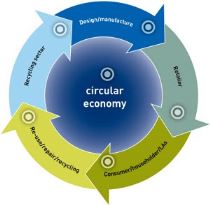In order for European manufacturers to prepare for this new circular economy, it’s important that sustainability is no longer considered an after-thought.
I’ve spoken before about the importance of post-production services for manufacturers, to ensure they’re getting more out of every asset and better meeting customer demands.
What we’re now starting to see is manufacturers thinking about the way in which they’re manufacturing their products from the offset in order to better reuse the components used. This is based on the fact that landfill is becoming increasingly expensive, since it is a finite option, while customers and consumers are also becoming more aware of the products that they’re buying and want to feel better about their contribution to the global ecosystem.
 This is being dubbed ‘the circular economy’ and legislation is currently being discussed in Europe to force manufacturers to adopt these processes sooner rather than later. This year the European Commission adopted the Communication “Towards a circular economy: a zero waste programme for Europe” to establish a common and coherent EU framework to promote the circular economy.
This is being dubbed ‘the circular economy’ and legislation is currently being discussed in Europe to force manufacturers to adopt these processes sooner rather than later. This year the European Commission adopted the Communication “Towards a circular economy: a zero waste programme for Europe” to establish a common and coherent EU framework to promote the circular economy.
But what does this actually mean?
The European Commission’s aim for turning Europe into a more circular economy is to:
- boost recycling and prevent the loss of valuable materials;
- create jobs and economic growth;
- show how new business models, eco-design and industrial symbiosis can move us towards zero-waste;
- reduce greenhouse emissions and environmental impacts.
The Commission has also outlined new recycling targets across the EU, with the aim of creating 180,000 new jobs, while “making Europe more competitive and reducing demand for costly scarce resources.” You can find a detailed breakdown of the specific targets in “Moving towards a circular economy” on the Commission’s environment website.
Two ways in which manufacturers can, and already are, preparing for these targets are re-manufacturing and recycling:
Re-manufacturing involves customers returning products to the original manufacturer, who will then disassemble it, clean it, repair it, etc, and then reassemble it, providing the customer with a new warranty, all at a lower price than a brand new one.
This has also led to a change of thinking in the engineering and design departments to ensure that they can do this efficiently and effectively. This has led to the emergence of organizations such as the Cradle to Cradle Marketplace, which sells only Cradle to Cradle (C2C) certified products – in other words, products that have been designed with their entire lifecycle in mind. C2C-certified products go through rigorous tests for material health to ensure that they have no negative impact on humans or the environment and they are safe to be re-manufactured as part of the lifecycle.
Caterpillar is actively promoting re-manufacturing as part of its sustainability targets. Cat Reman, a leader in re-manufacturing technologies and processes, returns products at the end of their lives to same-as-new condition and helps reduce owning and operating costs by providing its customers same-as-new quality at a fraction of the cost of a new part. This then helps reduce waste, lower greenhouse gas production and minimize the need for raw materials.
Manufacturers are also starting to design products with recycling in mind so that they can promote it to their customers and also better adhere to European Commission regulatory requirements.
This means that materials are being kept ‘in-service’ for longer rather than just being dumped in landfill. A great example of this is British Gypsum, which is offering a Plasterboard Recycling Partnership to reduce landfill waste and also help customers save money in the process.
As part of its 2020 Sustainability Ambition Programme, Nestlé’s premium coffee brand Nespresso is also planning to increase recycling capacity for its aluminium capsules to 100% globally. Currently, 75% of customers worldwide can order recycling bags to return their aluminium capsules with new online coffee orders as a Nespresso Club Member or purchase from Nespresso stores.
In order for European manufacturers to prepare for this new circular economy, it’s important that sustainability is no longer considered an after-thought. It needs to be front of mind from the very moment a new product is designed and manufactured to ensure that any re-manufacturing or recycling of the product is simple and has minimal disruption to the environment. This will also help them provide a better service to customers and gives them confidence that they are also contributing to a more sustainable industry.
- First published in The Manufacturer on September 12, 2014. Republished with permission.
[Image of the circular economy via WRAP UK]
Aeron Jensan
So pleased to see the progress towards designing products with purpose to recycle packaging